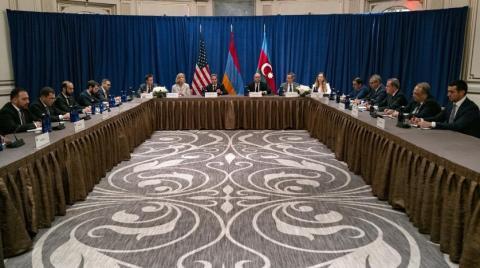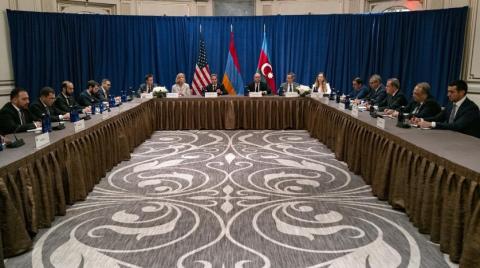
ANKARA: Special envoys from Turkey and Armenia held their first round of talks in Moscow on Friday in the first steps towards normalization of diplomatic and commercial ties between the two countries.
Armenia will hope that the talks will help it break its regional isolation, while for Turkey they are part of its wider efforts to rebuild trust with its neighbors and reduce the potential risk of conflict.
The first face-to-face meeting between the two countries since 2009 lasted for 90 minutes. Armenia’s special envoy is 31-year-old deputy parliamentary speaker Ruben Rubinyan. Turkey’s representative is its former ambassador to the US Serdar Kilic, a 64-year-old senior diplomat.
The move was welcomed by both the European Union and the US.
According to an official statement from the Turkish side, the special envoys “conducted (talks) in a positive and constructive atmosphere” and “exchanged their preliminary views regarding the normalization process through dialogue between Turkey and Armenia.
“(Both) parties agreed to continue negotiations without preconditions aiming at full normalization. The date and venue of their second meeting will be decided in due time through diplomatic channels,” the statement continued.
Although experts hailed the beginning of talks between the two countries as a promising development, they also remained cautious and acknowledged that there will be no easy breakthrough in the frosty relationship.
Nigar Goksel, Turkey director of the International Crisis Group, told Arab News: “The Turkey-Armenia track and the Armenia-Azerbaijan track are referred to as ‘mutually reinforcing’ by Ankara, which reflects a hope that progress on one will positively feed into the other.
“Azerbaijan has regained the territories around Nagorno-Karabakh, which was the main issue holding back Turkey-Armenia normalization since 1993,” she continued. “However, Azerbaijan wants to see progress towards the opening of a new transit route to Nakhchivan through Armenian territory. The extent to which Azerbaijan’s expectations will bleed into Turkish-Armenian negotiations has yet to be seen.”
Both Baku and Ankara are keen to reopen a land link connecting Azerbaijan with its exclave of Nakhchivan and on to Turkey through Armenia’s Syunik province.
Azerbaijan has also prioritized projects in the Zangezur corridor that will comprise roads and railways across territories in Syunik.
The renovation of rail connections between Armenia and Turkey is expected to bring economic benefits as they could be used by traders from Turkey, Azerbaijan, Armenia, Russia and Iran.
Because of its decades-long isolation, Armenia has been excluded from the key oil and gas pipelines, as well as rail networks, in the South Caucasus.
“Heading into the talks, stakes were high,” Samuel Ramani, a tutor of politics and international relations at the University of Oxford, told Arab News.
Turkey closed its border with Armenia in 1993. The two countries reached an agreement in 2009 to establish formal relations, but the peace accord — which was opposed by Azerbaijan — was never ratified.
Ankara announced that it is coordinating the current rapprochement process with its key regional ally Baku, while Turkish President Recep Tayyip Erdogan said on Thursday that Armenia should establish good ties with Azerbaijan if it expects results from the current reconciliation.
“Turkey and Armenia have experienced disruptions to their bilateral relationship since 2009 and a cessation of all but indirect bilateral trade,” Ramani said.
However, Ramani warned, the talks are unlikely to lead to a short-term breakthrough.
“The 1915 massacre of Armenians under the Ottoman Empire — considered as genocide by Armenia — continues to hang over the bilateral relationship, as do ongoing tensions between Armenia and Azerbaijan, which (tend to) flare up but stop short of open conflict. What these talks might provide is a foundation for future, more comprehensive, discussions,” he said.
Yerevan expects that the talks will lead to the consolidation of diplomatic relations, the opening of land borders that have been closed since 1993, and the mutual appointment of ambassadors.
The opening of borders will help the landlocked Armenian economy increase its trade with Turkey, which was valued at $3.8 million in 2021, while Turkish goods will then have a good opportunity with compete with more-expensive Russian imports in Armenia. Armenia lifted its embargo on Turkish imports in December.
Turkish Foreign Minister Mevlut Cavusoglu recently floated the possibility of launching charter flights between Istanbul and Yerevan, which are expected to begin in early February.











